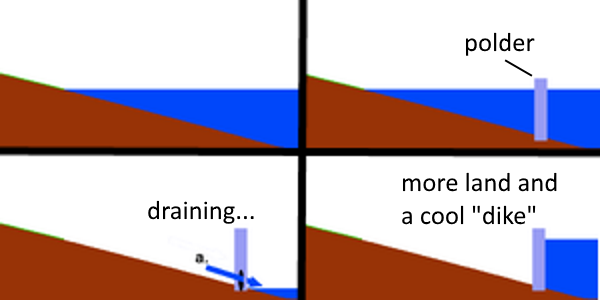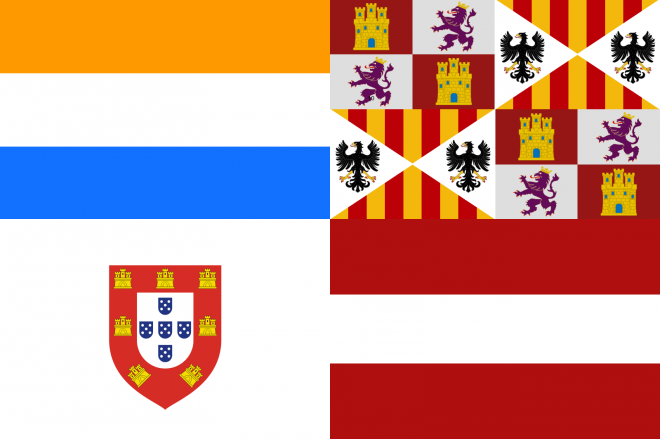I recently posted the Origin of EU4 Global Empires Part One. In part one, I briefly described England, France, Russia and The Ottoman Empire. Today, I am here to with part two, covering global empires like The Netherlands, Castile/Spain, Portugal, and Austria and their tradition, national ideas and ambitions.

1. Netherlands
The Netherlands is a form-able nation that doesn’t exist in the beginning of the game. Any Dutch or Flemish cultures nation can form it after meeting the criteria.
Traditions
+50% Naval force limit modifier, -10% Shipbuilding time
- The Dutch Republic used to have large trading fleets and were the dominant trading power in the the East Indies and the Americas. The Dutch can build up a large fleets quickly with this tradition in game.
National Ideas:
1. Found the Amsterdam Wisselbank: +0.10 Yearly inflation reduction
- The direct translation of Amsterdam Wisselbank is Amsterdam Exchange Bank, it was one of the earliest central banks in the world. In reality, the purpose of central banks is to maintain stability of currency, controlling interest rates, money supply and to oversee the commercial banks. In game, this central bank is doing its work on reducing inflation.
2. Dutch Trading Spirit: +1 Merchants, +10% Trade Range
- The Netherlands was one of the first European nations to set up trade companies in the Far East, build sugar plantations in South America, establish colonies in what is now New York and South Africa, and monopolize trade with Tokugawa Japan. This is one of the earliest forms of globalization. The Dutch have an extra merchant and more trade range to let them globalize easier.
3. Polders: −10% Development cost
- Polders are constructions that are build in water and able to drain all the water and claim more usable land when the tide is weaker. It is too technical for me to describe in words so I make it as an image below to show how polders work. More land means more options for development and hence it offers such bonus.

4. Instructie voor de Admiraliteiten: +2 Naval leader fire
- The direct translation of this phrase would be “instruction of the admiral”. This is most likely referring to Michiel de Ruyter, one of the most famous admirals in the Netherlands. He fought multiple naval battles in the first, second, and third Anglo-Dutch War and won multiple victories. In game, this boosts the naval strength to the end of the game.
5. Embrace Humanism: +3 Tolerance of heretics
- In EU4, the term “heretics” refers to different branches of the same religion group, such as Catholics and Protestants. Both are in the same branch of Christianity but have different values. One of the famous Dutch Reformed Catholic humanist thinkers, Desiderius Erasmus criticized Martin Luther and the Catholic Church. In game, all three branches get along well.
6. Army Sappers: +10% Siege ability
- Sappers are military engineering units who build bridges, forts, and siege requirements. The Dutch Brigade is a notable military engineering unit in the Peninsula War. In game, they can help the army to win siege battle faster.
7. Platoon Fire: +10% Infantry combat ability
- The Dutch army had pioneered a firing tactic known as Platoon Fire. It allows three ranks of musketeers to fire simultaneously by firing and loading in rotation. In game, this tactic strengthens the Dutch army.
Ambitions:
- +15% Trade efficiency
- Overall, the Dutch are merchants with strong security. With a military and commerce bonus, the Netherlands can be a strong and wealthy nation.

2. Castiles/Spain
Traditions:
+15% Morale of armies, +1 Missionaries
- Historically, Spain formed alongside Castiles, so they share the same national idea. In game, Aragon, Navarre and even Portugal can form Spain. In the beginning of the game, the Spanish kingdoms almost finished the reconquista after being ruled by the Moors for centuries. The success of the reconquista may be due to higher morale from the religious war with the Moors. In game, add a missionary to Spain as Spain converted the conquered regions into Catholicism.
National Ideas:
1. The Reconquista: +5% Discipline
- As with the tradition, the reason of the successful Spanish reconquista was the Spanish kingdoms having stronger army than the Moors. Higher discipline and morale were essential for a stronger army.
2. Spanish Inquisition: +2% Missionary strength
- Although the Inquistition is considered an intolerant event in modern society, it was indeed an efficient way to convert Muslims and Jews into Christians after the reconquista through violence.
3. Inter Caetera: Can fabricate claims on any overseas province, +1 Colonists
- The Inter Caetera was issued by Pope Alexander III for the Spanish kings right to claim lands south and west of the Azores. This resulted the Spanish claiming and colonizing most of South America and Latin America in the new world. In game, Spain can make claims on any non-European province and add an extra colonist. It is a very powerful bonus for colonial expansion.
4. Devout Catholicism: +2 Yearly Papal influence
- King Philip II of Spain is a devoted Catholic and supported the Inquisition. Also, he organized the Spanish Armada to attack the Protestant English.
5. Treasure Fleet: +10% Provincial trade power modifier, +15% Global tariffs
- Treasure fleets are ships that carry goods between the Spanish colonies and Spain. In game, it strengthens domestic trading as the provinces have more wealth. At the same time, as trading with colonies increases, tariffs are very likely to increase.
6. A Spanish Armada: +10% Heavy ship combat ability
- Indeed, the Spanish Armada, funded by Phillips II, was the strongest and largest navy force in the 1500s.
7. Siglo De Oro: +1 Yearly prestige
- The direct translation for Siglo de Oro is “Spanish Golden Age”. The Spanish controlled a vast land from California to the Southern tip of Argentina. They had also taken the Philippines. It was a strong and wealthy empire until Latin American Revolution. In game, a prestige bonus is given due to this large colonial empire.
Ambitions:
- +25 Global settler increase
- It is possible to describe Spain with three words, “faith, war, and colonies”. Its intolerance and aggressiveness is hardly considered as ethical but that was how it is in history. Paradox Interactive is doing their best to simulate it.

-
3. Portugal
Traditions:
+5% Trade efficiency, +30% Trade range
- Portugal’s conquest of Goa, renting Macau as a port in China, colonization of Brazil and West Africa and the spice trade gave it an early globalization commerce. With these bonuses, it would be easy for Portugal to achieve the same in game.
National Ideas:
1. Legacy of the Navigator: +25% Colonial range
- Portuguese navigators had explored and mapped the coast of Africa, Brazil, India and Canada. In this period, famous explorers such as Bartolomeu Dias crossed Cape of Good Hope into the Indian Ocean. Later, Vasco da Gama traveled to India. Since explorers can travel farther in game, the Portuguese can colonize even more land.
2. Afonsine Ordinance: +10% Goods produced modifier
- This is a period of time when war and conflicts ended. Portugal entered a time of peace with neighboring nations, discovered India and began the Portuguese Empire. It was considered a fortunate period. In game, this “fortune” is having the ability to produce more goods that will last to the end of the game.
3. Feitorias: +10% Global trade power
- Although feitorias’s translation is “factory”, it refers to trading post during this time period. They can be warehouses or a market in foreign land. More feitorias means more international trade. In game, it gives an extra bonus on trading with foreign nations.
4. Encourage the Bandeirantes: +1 Merchants
- In the 17th century, Portugal encouraged settlers to have venture into Brazil to seek fortune. At first, commerce involved selling natives into slavery but later turned to gold, silver and diamond mines. Either way, it increased trading. This time, the game offers an extra merchant because it is bad game design to have two ideas that offer the same bonus.
5. Royal Absolutism: −15% Build cost
- Pedro II was the first ruler to introduce Absolute Monarchy into Portugal. At the same time, Pedro is an architect, therefore Portugal can have a discount on future constructions in game.
6. Land before Faith: +15 Global settler increase
- Portugal got it priority correct! The Jesuit Jesuit missionaries only converted a small portion of Japanese, Chinese and Indian population into Christianity. However, the colonists got their jobs done by settling down in foreign soil and being able to trade with the nations in the Far East. In game, the colonists can build their colonies faster.
7. Open up the Guilds: +10% Trade efficiency
- Sebastião José de Carvalho e Melo was a Portuguese statesman who realized Portugal was less advanced than Europe in the Enlightenment Age. He had started the Pambaline Reform to regulate production quality and encourage colonists to venture into Brazil. In game, this economic reform give Portugal a better trading bonus.
Ambitions:
+20% Global tariffs
- Compared to Netherlands, Portugal liked to focus more on trading and sailing than engaging in wars. Geographically, Portugal is located at the edge of Europe. In history, Portugal had long term alliance with major powers like Spain and England. There aren’t many chances for Portugal to get involved in wars.

4. Austria
Traditions:
+10% Morale of armies, +30% Better relations over time
- Today, Austria is a small landlocked European nation located in Central Europe. Before the Napoleonic wars, it used to be the center of the Holy Roman Empire. The Holy Roman Empire is not technically an empire but instead a collection of states. Its Austrian Habsburg Dynasty had a royal relationship with houses within all colonial powers in the list of part one and part two. Austria’s army also stopped the Ottoman army at Vienna. Hence it has +10% morale bonus better relationships with its “cousins” in game.
National Ideas:
1. Imperial Ambitions: +10% Imperial Authority, −15% Diplomatic annexation cost
- As Frederick III was elected to be the Emperor of the Holy Roman Empire (HRE), it was given imperial authority bonus in game to make annexation of HRE members easier.
2. Military Frontier: -10% Fort maintenance, +15% National garrison growth
- Austria was on the front line against the Ottoman Empire. Historically, the Ottoman expansion on Europe was stopped at Vienna. Hence this bonus allows Austria build more forts with more garrisons.
3. Fugger Banks: +0.05 Yearly inflation reduction, −1 Interest per annum
- The Fugger family were prominent bankers and venture capitalists in the 15-16th century in Europe. They were once able to replace the Medici family in banking and became the wealthiest family in Germany. In game, their bank helps reduce inflation and interest rates from loans.
4. Habsburg Dominance: +2 Diplomatic reputation
- The House of Habsburg was once in the same dynasty with Spain, England, Russia, and Germany. Most of the global powers were related to the Habsburg family. In game, this offers a diplomatic reputation bonus to Austria with its strong political influence.
5. Edict of Restitution: +2% Missionary strength
- This is another mention of the conflict between Protestants and Catholics. This edict was created to convert Protestants into Catholics and tried to stop Catholics being secularized. In game, this bonus allows Austria to convert other faiths faster.
6. Austrian Court: +1 Diplomatic relations
- As mentioned above, the House of Habsburg was super influential in Europe. With this bonus, Austria can have one more relationship with another nation in game.
7. Hofkriegsrat: +30% Reinforce speed, +3% Discipline
- The Hofkriegsrat is the court war council of Austria. It is a council of generals and officials who finance warfare and deploy the army. In game, it helps the empire to reinforce units faster and with more discipline.
Ambitions:
+50% Chance of new heir
- Even in WWI, three cousins (Great Britain, Russia and Germany) related to the Habsburg were fighting each other. Austria integrated with Hungary to form Austria-Hungary. This long lasting bloodline dynasty shaped its strong influential power in Europe. Overall, Austria is a nation with strong military and diplomatic power.
This is the list of eight historical global powers and the explanation of their traditions, national ideas and ambitions in Europa Universalis IV. I did consider writing about the Polish-Lithuania Commonwealth as it is usually one of the strongest nations in the game. However, Austria has better networking ties with other global powers . I will cover the Commonwealth in the next post, in which I will be talking about regional powers.







Published: Mar 25, 2016 07:15 pm